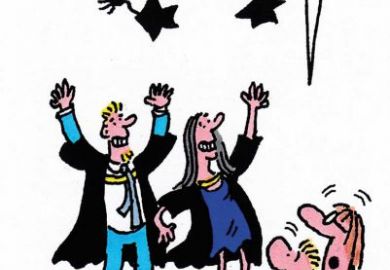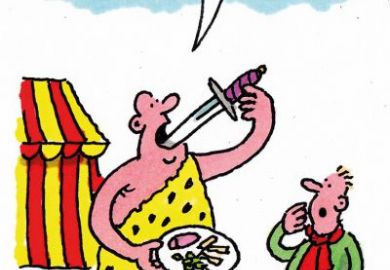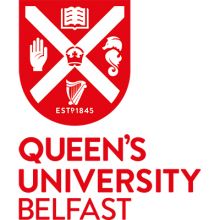
After running the Russell Group since its incorporation in 2007, Wendy Piatt is to step down in February – only a few months after she was the centre of a media storm involving her private life. Dr Piatt’s image was plastered across tabloid newspapers in August over allegations that she had been involved in an affair with António Horta-Osório, the chief executive of the Lloyds Banking Group. The Sunday Times later reported that Dr Piatt was being investigated by the Russell Group over whether she breached rules by meeting Mr Horta-Osório during a business trip to Singapore. After a wide-ranging internal review into “processes and protocols” at the organisation, Times Higher Education understands that no evidence was found of wrongdoing related to Dr Piatt’s travel and expenses. The timing of her departure may still raise eyebrows, although a spokesman for the group said her decision to step down was “unconnected” to her personal life.
Amid the usual flurry of New Year Honours for academics, it also emerged that Phil Scraton, who led crucial research into the Hillsborough disaster, declined an OBE in protest at those who “remained unresponsive” in helping the victims. Professor Scraton, professor of criminology at Queen’s University Belfast, who wrote for Times Higher Education last month on his experiences, said that “successive governments declined to pursue a thorough, independent review of the context, consequences and aftermath of the disaster”, a situation that changed only “as a direct result of the families’ and survivors’ brave, persistent campaign. I could not receive an honour on the recommendation of those who remained unresponsive to the determined efforts of bereaved families and survivors to secure truth and justice.” He added that he could also not accept an honour tied by name to the British Empire, given that as an academic he remains a “strong critic” of imperialism and its legacy.
A row over whether anti-Semitism is increasing in UK universities erupted after a former chief complaints adjudicator for higher education claimed that Jewish students were avoiding certain universities because of the problem. In an interview with The Daily Telegraph, Baroness Deech also suggested that some institutions may not be tackling anti-Semitism because they were “afraid of offending” Gulf states that were potential sources of donations. “Amongst Jewish students, there is gradually a feeling that there are certain universities that you should avoid,” she said. While some commentators agreed with her comments, some universities and student groups reacted angrily to suggestions that campuses had become “no-go zones” for Jewish students. The Union of Jewish Students said that while it was true that there had been a “worrying rise in anti-Semitism on UK university campuses”, her claims of certain institutions being avoided did not “fully portray the experiences of Jewish students”.
The world is in danger of running out of ideas if it doesn’t keep increasing the number of researchers, The Times warned on 24 December. The paper said that an analysis from academics in the US found that the number of scientists needed to maintain technological progress had gone up by a factor of 25 since the 1970s – with research productivity on the decline except for a blip in the early 1990s. Thankfully, Michael Webb, a Stanford University economist and one of the authors of the paper, said there was an optimistic take to be drawn from the analysis. “The optimistic reading…is that all we have to do to get continued growth is keep adding more scientists in order to offset their declining productivity,” he said. Well that’s OK, then – it’s not like that plan is threatened in the UK by Brexit or anything.
Twitter reacted with glee during an edition of Christmas University Challenge after host Jeremy Paxman appeared to give the incorrect answer to a question. According to Esquire, the presenter asked how many points the word “party” would score in Scrabble. A team of alumni from City, University of London answered wrongly, saying that the total was “17”, but Paxman then seemingly made a blooper himself by telling the audience that the correct answer was “11”. A quick google of the Scrabble score for the word suggests it is in fact “10” and there was an outpouring on social media as viewers quickly seized on a chance to have a pop at the host. “I've never seen my mum angrier about anything than the incorrect scrabble q,” was an example of one response on Twitter, from @bckycrns. Maybe Paxman has been playing Scrabble with Spinal Tap.
Register to continue
Why register?
- Registration is free and only takes a moment
- Once registered, you can read 3 articles a month
- Sign up for our newsletter
Subscribe
Or subscribe for unlimited access to:
- Unlimited access to news, views, insights & reviews
- Digital editions
- Digital access to THE’s university and college rankings analysis
Already registered or a current subscriber?




